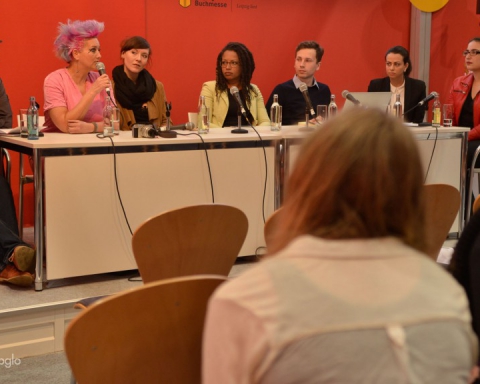
Editor’s note: Today is the debut of our new #Literature columnist, Prof. Dr. Helena Flam, who even has her own Wikipedia article. She is a dear professor of Sociology at Universität Leipzig, a voice of reason tempered by deep compassion when needing to ask tough questions of the people presenting during conferences and seminars. She is also a lover of books and the arts – the first person to tell me that I needed to check out Spinnerei and other arts centers and events when I first moved to Leipzig, sticking a bunch of flyers into my hands. Here in the first installment of her opening series – From My Suitcase – the reader can feel the delight and agony Prof. Flam went through with every peak and through of a certain book dealing with family, separation, longing, loss, unfulfilliing jobs and unfilfilled hopes, impossibly adverse social and weather conditions… something that directly speaks to many of us.
From My Suitcase: Part I
By Helena Flam
Last Sunday I bought an old, flea market suitcase so that I could put in it disheveled piles of books conspiring to build up yet another wall next to my bed. Of the previous wall my lovely daughter disposed of by kidnapping the books and placing them in double rows on a shelf she had cleared for this purpose. By now the double rows have grown towers. So a suitcase seemed like a good solution. Now, a week later, I am quite certain that these books just had to be locked up! They are great books but… not for the fainthearted. And, safely locked up, they cannot haunt me as when they were at large. The idea is: I will set them briefly free for review purposes and then lock them up again. Let us see if you agree that they deserve it.
Let me start with the book that broke my heart. I never finished reading it. As a matter of fact I did not venture very far into it. By now I remember only vaguely: the story focuses on a European style disintegrating brick house somewhere in the middle of a jungle and the judge – now retired but still keen on having his tea served properly, his granddaughter – longing for her private tutor, and the cook – who tries the best he can to deal with human caprice and the unrelenting forces of nature, invading even the innards of his wood-fired, no-chimney kitchen, in order to serve his master at least a meager resemblance of a proper English tea. I remember the incessant downpour of rain, the mist, the unsurpassable roads and a ghost town. The ghost town is located not too far away but only during the dry season. And there are stories told by the author about some of its inhabitants as well as the judge when he was young and aspiring and sent for his education to England, as so many young men from the British colonies were (and still are). The granddaughter has both a past and an inner life completely on her own as well. So does the cook. The author shares with you her privileged knowledge of both.
So the book draws you in. So you move in with the judge to occupy a quiet observer spot in his house. The judge indeed just wants to be left in peace, as the cover says. And is cantankerous. Perhaps he finds a perfect analogue in this primitive decaying house, rapidly shedding whatever there was to start with of its civilisational refinements, mindless of the lush ferns and other elements unceasingly doing their work. But neither his granddaughter nor his cook do. She might occasionally enjoy the way the droplets of mist play in the air or on her skin, but it takes the cook forever to get the fire going to prepare a meal and he finds nothing romantic in intrusive scorpions or roof leaks.
The author of the book had me stuck in that awful house for a long time. She had me also meandering through Nepal and then put me under the enormous pressure of jump-starting in the US with no money or friends. Ostensibly because that is where young male (poor and rich, and not only male) migrants go these days.
In this book the poor male migrant happens to be the son of the cook.
The cook, when confronted with two policemen about to search his hut, felt “pained to see how little he had: a few clothes hung over a string, a single razor blade, a sliver of cheap brown soap, a cardboard case with metal clasps that had belonged to the judge and now contained the cook`s papers… And, in the sateen elastic pocket inside the case . . . a broken watch that would cost too much to mend. . .” (18-19). The policemen do not leave a single item untouched, read every document, every cherished rare letter from his son. They leave the hut in a state of complete disarray, the overturned threadbare mattress exposing the newspapers placed on the bed grid to soften the sleep. The cook`s humiliation is complete, when, while he bends to look for the vanished silver knob of his precious watch that “would cost too much to mend”, the judge`s granddaughter enters his hut to help.
Having read all this you are better prepared for the heartbreaking moment than I ever was. Because the author tells you this story and that. Makes you forget the monsoon rain and the cook – both, after all, typical imaginaries of Asia. So what do you care. A little perhaps but not too much.
One of the stories is about the tremendous efforts involved in mobilizing people and resources to get the cook’s son over to the US. And about the son’s utter misery as it turns out that networks can only secure a few nights in houses bursting at their seams from human bodies. Refusing any further help, they sentence him to seeking sleep in uninhabited basements crawling with all sorts of vile creatures. He cannot keep a job he finally finds because even when a well-meaning wife of a shopowner gives him a bar of soap, it is of no avail. No showers, not even a drop of water, come along with unheated basements.
The cook meanwhile saves all much longed for “all is well” letters from his son in a cardboard box. He brags about his son’s American employer to whoever will and will not listen. Even to the policemen who search his hut. His son is, after all, his main source of joy and pride.
And now comes what made me put away this book: the cook has been now waiting for months to hear from his son. The monsoon rain has also been at it for months, wreaking havoc with the jungle, the roads and the houses. Very rarely does a human being brave the weather to visit their house. So time empties and slows down. The cook waits. When the news that the roads are about to become traversable reaches the house one day, the cook grows shyly hopeful. Now waiting for the postman becomes excruciating. When will he finally find his way to this part of the jungle? Then one day, the hour comes. The postman reaches into his bag, pulls out and hands over the letter. The cook is expectant. Joyous.
Only when his eyes move from the hand of the postman to the letter, he sees nothing but the American stamp. The rain had washed everything else away.
***
Kiran Desai, The Inheritance of Loss, Penguin Books, Winner of the Man Booker Prize 2006









